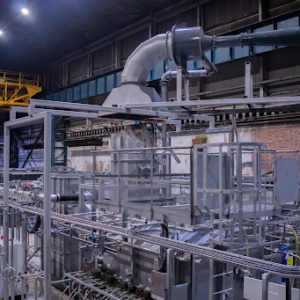-
Glass Futures joins IFRF as a member and as its latest Preferred Research Partner
Date posted:
-
-
-
Post Author
Greg Kelsall
-
-
IFRF are pleased to announce that Glass Futures (GF) has become an IFRF member and has joined the IFRF Preferred Research Partner network. Their significant research and test capabilities relating to decarbonising industrial processes, particularly the glass industry, adds further to the current IFRF PRP portfolio provided by the University of Sheffield’s Translational Energy Research Centre (TERC) in the UK (the home of IFRF), the Gas-und Wärme-Institut (GWI) in Germany, Zhejiang University (ZJU) in China, Fives Pillard’s European Combustion Centre in Italy and Air Liquide’s global R&D centres including the Innovation Campus in Paris, France.
In fact, IFRF and Glass Futures have already had some interactions. IFRF Italian member, Stara Glass provided the design for the 30 tonne/day facility described below, together with Green Flames Technology providing two IFRF probes for the same rig.
I asked Rob Ireson, Innovation and Partnerships Manager at GF to describe their capabilities and offerings to IFRF members and partner organisations:
Glass Futures is a not-for-profit Research Organisation, with a membership comprising some of the world’s largest glass manufacturers, end-users, supply-chain partners and academic institutes. It connects the global glass industry and academia to deliver R&D and innovation, ensuring glass making’s future is built on high value and fully sustainable, zero-carbon products.
Glass Futures in collaboration with the global glass industry is delivering the world’s first openly accessible, commercially available, multi-disciplinary glass melting facility, The Global Centre of Excellence in St Helens, UK with provision for research and development trials to decarbonise the global glass and foundation industries.
The research and technology organisation was awarded a £7.1m contract in 2020 by the UK’s Department of Business, Energy and Industrial Strategy (BEIS) to research and deliver new energy sources to the glass industry. The flagship project, Industrial Fuel Switching (IFS) Phase 3 programme, involved test firing hydrogen and bio-fuels in a scale model glass furnace at temperatures in excess of 1500 °C, simulating real world firing conditions for alternative fuels. The project is also evaluating the associated technical, economic, and environmental aspects of fuels.
In an IFS Phase 2 follow-on project, the organisation is also actively working on combustion technologies with ceramics and steel manufacturers, as several modifications were made to the multi-fuel combustion rig to grant the ability to simulate certain ceramics kiln and steel furnace conditions.
Trials similar to this will be delivered at the 165,000 sq ft state-of-the-art pilot plant, capable of producing up to 30 tonnes of glass per day in a purposefully designed research and development furnace. Members, researchers and industry leaders will collaborate and experiment with different energy sources, raw materials and technologies to demonstrate solutions leading to sustainable energy usage in the glass-making process.
In terms of Glass Futures offering to IFRF members and partner organisations, this covers the development and assessment of industrial combustion and furnace-related technologies, including low-carbon fuels, for industrial applications:
- Use of the multifuel combustion test bed to assess and benchmark hydrogen, liquid biofuels, gaseous bio-derived fuels and blends of the three against natural gas
- Use of the 30 tonne/day glass melting pilot furnace, expected to be operational from early 2024, capable of operating on a range of fuels and capable of assessing technologies such as emissions control, waste-heat recovery and Carbon-capture
- Preparing for and running industrial-scale trials of combustion technologies at commercial manufacturing facilities
Please get in touch with a member of the Glass Futures or IFRF team to find out more.

Multi-fuel combustion test rig
